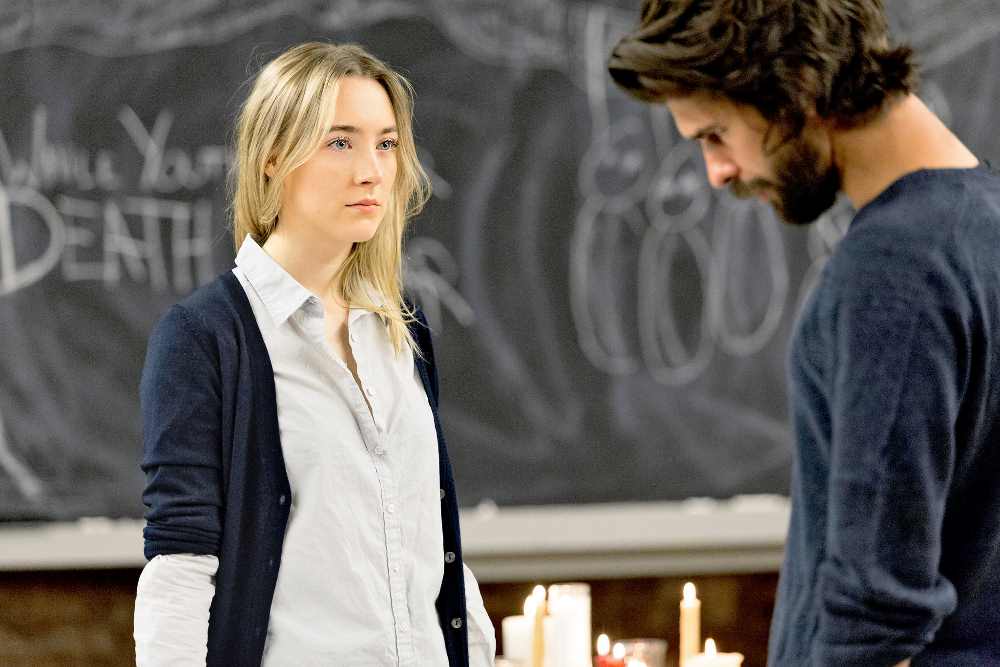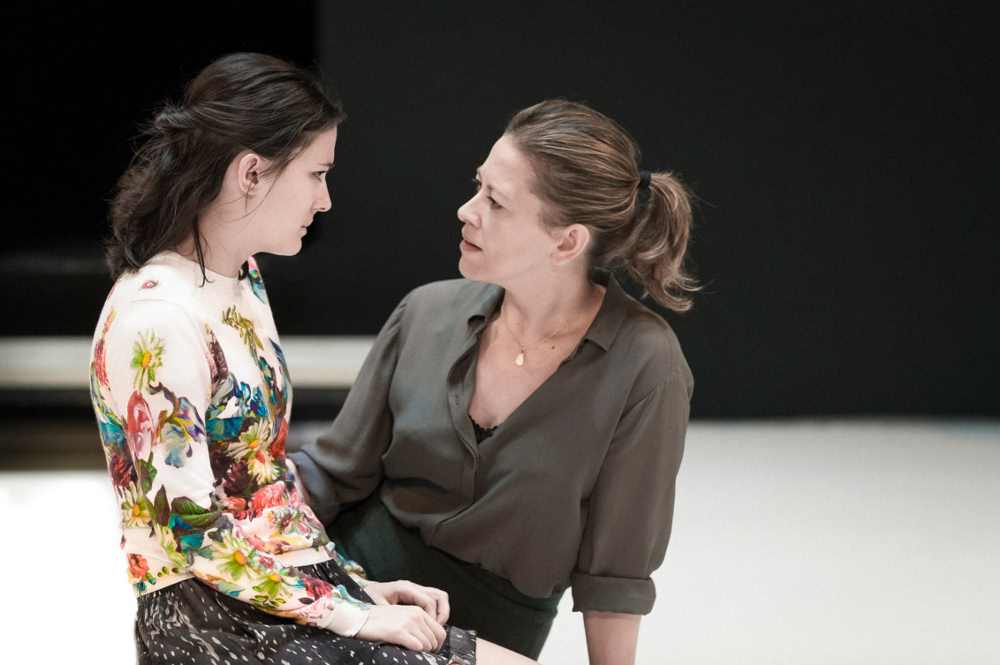When Linda Loman said, “Attention must be paid,” at the end of Death of a Salesman, she was asserting that her husband should receive the recognition he deserved. But the same demand could be made on behalf of the women in almost all of Arthur Miller’s plays.
Commonly known as the writer of stories about fathers and sons, the Harlem-born playwright first received dramatic acclaim for All My Sons, which bowed on Broadway in 1947. Chronicling a day in the life of an all-American family hiding deadly secrets, the play is deeply rooted in patriarchal roles. However, it was a real-life story about a young woman who told on her father for selling faulty supplies that first inspired Miller to write the play. Miller heard the story from his mother-in-law, but chose to change the young woman to a man because, as he told a BBC reporter in 1999, “I didn’t know much about girls then.”
“That’s crap,” said playwright Theresa Rebeck, after hearing Miller’s statement. “Arthur Miller knew more about the strength and courage of women than he often gets credit for.”
Rebeck is familiar with the women of All My Sons, having directed a production at Houston’s Alley Theatre in 2015. In her production, Rebeck was determined to look beyond any period-specific mannerisms and delve into the timeless aspects of the play. For Rebeck, that meant exploring the empowerment and sexuality of Kate Keller, the wife of Joe, who refuses to acknowledge that her older son has died, and Ann, the former girlfriend of Kate’s late son Larry, who is now involved with his brother Chris. But for the two to marry, Kate has to face the fact that Larry is dead.
Rebeck described Ann as “the mightiest blonde I’ve ever seen,” adding that she “ended up feeling like Ann is the problem and the problem solver. She’s got a lot of the period corny sweetness, and you realize the further you go with her that she continually makes choices that get her deeper and deeper into the story.”
Rebeck continued: “[Ann] saves [Chris’s] life. There are so many moments in the play that he could be lost, and she stands there and holds him together… My experience of All My Sons is that [Miller] doesn’t skim over their experiences. He doesn’t make them secondary characters. I think he is one of those great writers who fully inhabited those women.”
When Wendy Goldberg directed All My Sons at the University of Michigan, Miller’s alma mater, in 2015, she saw Kate’s role as a mother as the motivation for her actions. Citing her own experience as the parent of a young boy, Goldberg said her perspective on Kate, especially the character’s steadfast denial of her son’s death, changed through the years.
“Even if you’re not a mother, the prospect of being one, that it could be something in your life—that feels like a very important layer of understanding that a male would not necessarily have,” Goldberg said. “The visceral response that I have to what Kate is pushing away and trying not to believe in… that’s how I basically feel. I can’t even go there. I think I intellectually understood her,” Goldberg said, but not until she was a mother herself did she “viscerally, emotionally, totally get it in every cell of my being.”
Kamilah Forbes directed All My Sons at People’s Light in 2015, and for her, Ann and Kate demonstrated the role of women within a community striving for the American Dream, the seeking or dismantling of which is a frequent theme in Miller’s work. Forbes’s production featured an African-American cast, which recontextualized the characters’ sense of disempowerment in society.
“A lot of times, we may overlook them, particularly Ann and her strength and her fight, where, for me, that’s where my focus really lies,” Forbes explained.
Kate’s refusal to acknowledge Larry’s death, as well as her husband’s actions, drives much of the tragedy in All My Sons, and Forbes said she viewed the character’s strength as coming from a fierce determination to protect her family.
“Kate is a character that you could easily make a judgment call on if you’re playing with a crayon box of only 10 colors,” Forbes said. “She can easily be unlikable, but at the end of the day, she’s the most likable one up there. She knows how to manipulate everyone’s strings, but not always with malicious intent. It’s all to protect her roost. There’s something about women and their place in families which is like, ‘Don’t come for us.’ We can’t underestimate that.”
A mother figure’s determination to protect her family also propels tragedy in A View From the Bridge, Miller’s familial drama set in Red Hook, Brooklyn. The play, which opened on Broadway in 1955, has been frequently revived in the six decades since, and the most recent Main Stem production, which closed in February, came from London’s Young Vic and was directed by Ivo van Hove. Its female stars Nicola Walker, who played matriarch Beatrice, and Phoebe Fox, who played the young Catherine, believe the play speaks to women.
“We’ve had some weird reactions,” Fox said. “Some women come to see it and feel very empowered. And we have had women come and say, ‘I find it difficult as a feminist,’ which we found quite shocking. And we’re feminists!” She said that she and Walker see their characters as “quite strong and powerful.”
As the tension within the household builds, it is Beatrice who tells Catherine she should leave their home and live as an adult, and the dynamic between the two is forever changed. Speaking passionately about the depth of their relationship, Walker commented on the “fathers and sons” association with Miller, saying, “I think this production does right it a little bit. His mother/daughter writing is equally brilliant and incisive. I’ve never seen it like that. I’ve never viewed him as being as good at writing that mother/daughter dynamic.”
“The mother/daughter relationship is equally as important,” Fox added. “It’s got its own tragedy to it. The loss of that is what I find more upsetting than anything else.”

Women’s power is portrayed in a very different way in The Crucible, Miller’s allegory about McCarthyism told through the lens of the Salem Witch Trials. The play depicts the sweeping fear and accusations that begin when a group of young women, led by Abigail Williams, accuse various members of their community of witchcraft. Many of the girls are seen as being swept into group hysteria, but Abigail is proven to have ulterior motives.
The play is being revived on Broadway this season, also directed by van Hove, and is scheduled to open March 31 at the Walter Kerr Theatre. Tavi Gevinson, who plays Mary Warren in the production, reflected on the girls’ actions, noting that Miller wrote “that he saw himself in characters like John Proctor and Eddie Carbone, so I think it was more natural for him to sympathize with them and make them the protagonists, even when there’s a version of The Crucible where Abigail is not plainly antagonistic, but almost a victim.” In the Broadway production, Abigail is played by Saoirse Ronan, and Gevinson said that it’s been a thrill to witness “all the layers” that she and director van Hove have been “able to extract from a character who’s so often played as just a villain. This production doesn’t feel like it’s only the story of John Proctor, but also of what happens when a group of people—these girls, servants, who are given no room to develop a sense of self— suddenly rise up, and the cracks in this power structure begin to show.”
It’s striking to note that in the 72 years that have passed since Miller’s first Broadway play, The Man Who Had All the Luck, bowed in 1944, not one Broadway production of his work has been directed by a woman. Goldberg recalled this fact when she was invited to Westport Playhouse to speak on a panel about her All My Sons and realized she was the only woman on the guest list.
“For this to really be my first opportunity as a director to spend time in his world, looking at the distribution list was a reminder that we’ve been sort of boxed out of being considered for some of these jobs,” Goldberg said. “It kind of takes you down this black hole of what have we been locked out of, and who else have we not had the opportunity to interpret as American theatre directors? When you think about people who have long been associated with being the storytellers and primary holders of these narratives, they’re male.
“It’s interesting when you think of someone who’s written such incredible female roles that are so complicated and nuanced,” she continued. “We’re talking about inequity. We’re talking about who gets to tell the stories. He’s written some of the best female characters ever written for the stage, these remarkable women who are very ahead of their time, and that’s why I think it’s even more striking. This thing has happened with Miller where the telling of these stories has really been owned by a small group of men.”
Forbes chimed in, “It’s an easy assessment to say that’s Arthur Miler’s shtick: fathers and sons. But you’ve got to take a closer look at who’s pulling the strings, and it’s the women. It’s the women who have the depth and complexity and are grappling those huge questions.”
Indeed, in many of Miller’s plays, it is the women who are the truth tellers: Linda Loman informs her sons that Willy is suicidal; Elizabeth Proctor holds John accountable for having an affair with Abigail; and Ann is the one who shows the Kellers the letter that proves Larry is dead.
“The women in Miller’s plays are given a lot more agency to speak and to be vocal,” said Forbes. “These women are not only observers and able to sit by the sidelines and watch the men run in circles amongst themselves and make their own observations. Miller has given them agency and status in the world to speak up and to effect change.”
The aftermath of the change that the women effect often leaves them onstage at the conclusion of the plays, continuing to speak the truth. In All My Sons, Death of a Salesman, and The Crucible, the female characters are the ones who get the powerful last words of the plays.
“It’s sort of your last burning image,” Forbes said. “It becomes what his last statement is. He was always very fascinated by the women in his life. It’s no surprise to me that he would give them that much stature, status, and agency.”


